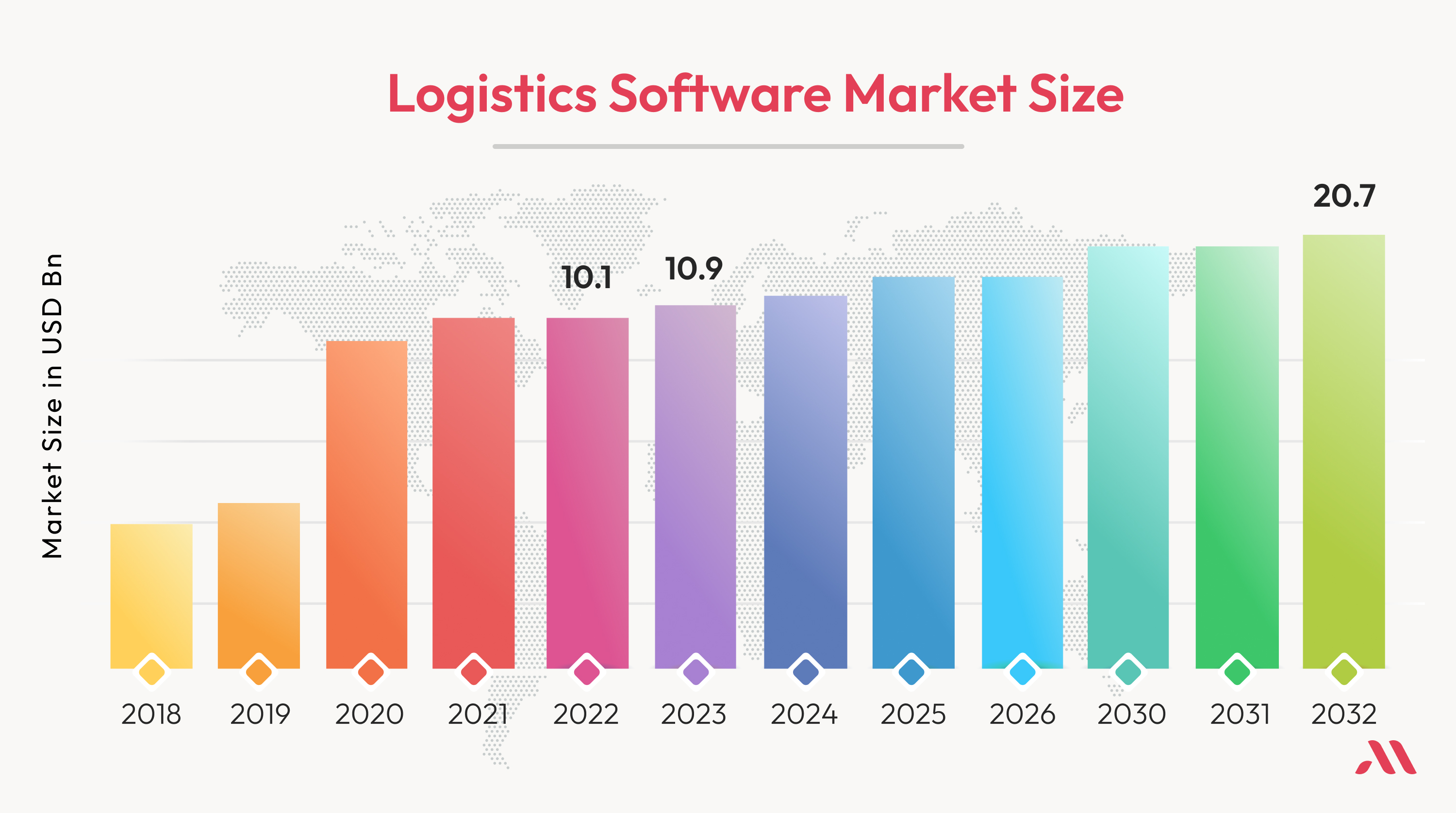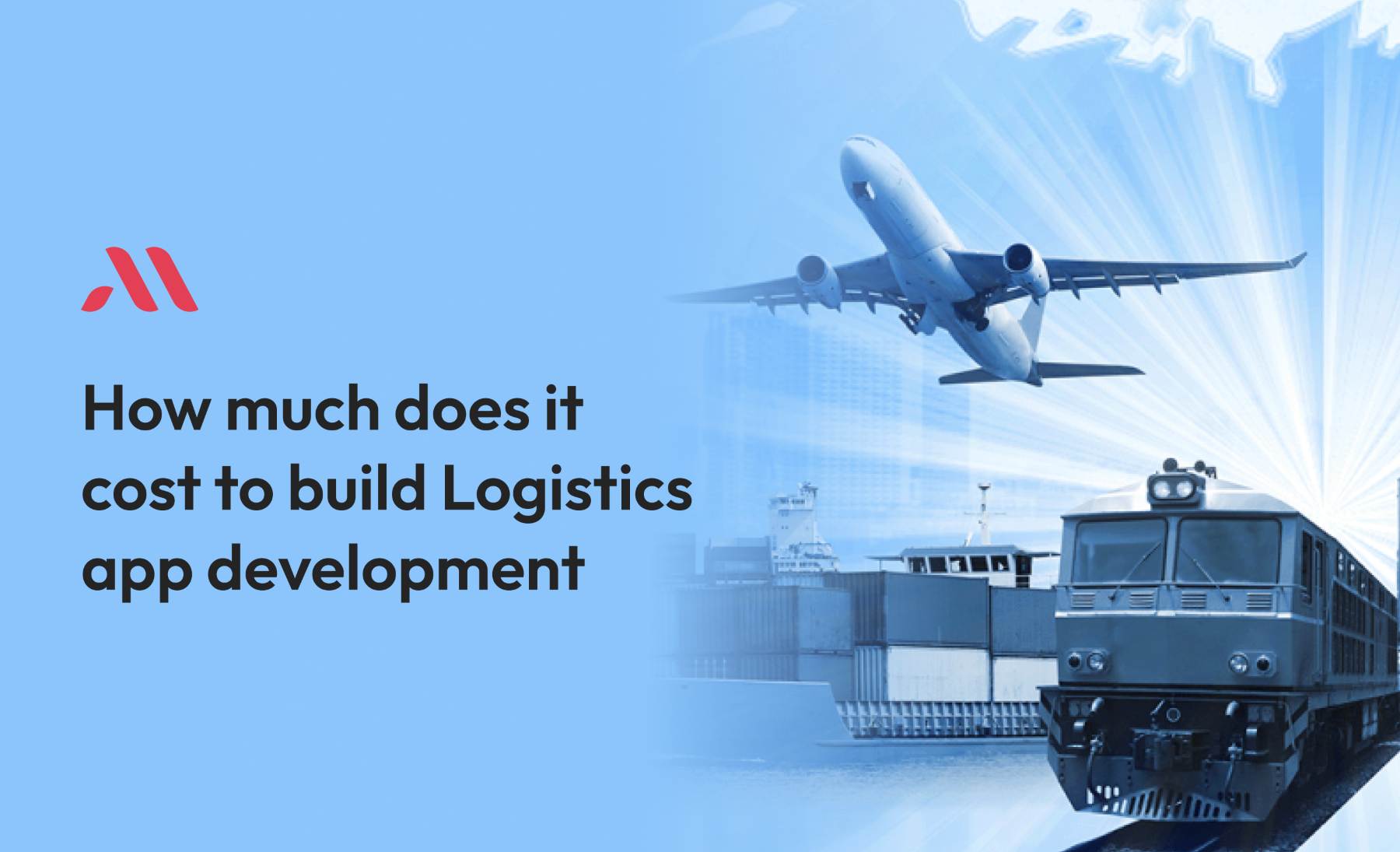As we step into 2024, the logistics industry faces new challenges. Are traditional ways enough for today's complex supply chain needs, or is it time for a tech upgrade?
Logistics professionals are turning to mobile apps in a world where quick coordination and real-time tracking are essential. How can these apps transform an industry dealing with transportation, supply chains, and last-mile delivery?
This article explores the changing world of logistics app development, looking at the big challenges and how mobile apps might be the key. As businesses seek faster and more precise logistics, can these apps be the solution?
In the sections ahead, we'll check out the important features of logistics apps, understand what affects their development costs, and see how real-time tracking can make a difference. Can logistics apps make operations efficient and ready for the fast-paced global market? Let's find out.
Logistic Software Market Size

https://www.marketresearchfuture.com/reports/logistic-software-market-4420
The Logistic Software market, valued at USD 10.1 Billion in 2022, is anticipated to experience substantial growth, reaching USD 20.7 Billion by 2032. This growth is projected to occur at a compound annual growth rate (CAGR) of 8.31% from 2023 to 2032. Key drivers of this expansion include the adoption of logistics software, which offers benefits such as time and cost savings, efficient labor management, and the increasing integration of digital technology in emerging economies. Overall, the market is poised for significant advancement, driven by these factors during the forecast period.
How Logistic Mobile Applications Work
Logistic Mobile app development functions as comprehensive tools designed to enhance the efficiency and precision of various logistics processes. The core functionalities of these applications typically include
Real-Time Tracking:
Logistic mobile apps leverage GPS technology to provide real-time tracking of shipments and vehicles. This feature allows users to monitor the location and status of their goods throughout the entire supply chain.
Coordination and Communication:
These applications facilitate seamless communication and coordination among different stakeholders in the logistics chain, such as suppliers, carriers, and recipients. Instant updates and notifications ensure everyone is on the same page.
Route Optimization:
Advanced algorithms within the apps analyze data to optimize delivery routes. This not only minimizes transportation costs but also reduces delivery times, contributing to overall operational efficiency.
Inventory Management:
Logistic mobile apps often include features for inventory management. Users can track stock levels, manage warehouse operations, and receive alerts for low inventory, ensuring a well-organized supply chain.
Document Management:
The applications streamline documentation processes by allowing users to generate, share, and store important logistics-related documents digitally. This contributes to a paperless and efficient workflow.
Data Analytics:
Logistic mobile apps leverage data analytics to provide insights into key performance indicators (KPIs) and trends. This data-driven approach enables businesses to make informed decisions and continuously optimize their logistics operations.
Customer Interaction:
Some applications include features for customer interaction, allowing recipients to track shipments, receive delivery notifications, and provide feedback. This enhances customer satisfaction and transparency.
Security Measures:
Security features such as authentication protocols and encryption ensure the integrity and confidentiality of sensitive logistics data, protecting against unauthorized access.
Factors Influencing Logistics App Development Costs
The logistics app development involves various factors that significantly influence the overall cost. Understanding these factors is crucial for businesses and developers alike.
Complexity of Features:
The number and complexity of features integrated into the app play a pivotal role. Advanced functionalities such as real-time tracking, route optimization, and inventory management contribute to increased development complexity and costs.
Platform Selection:
Developing a logistics app for a single platform (iOS or Android) may have lower costs compared to cross-platform development. Consideration of the target audience and market share is essential in deciding the optimal platform.
User Interface (UI) and User Experience (UX) Design:
The design intricacy and user experience expectations impact development costs. A well-designed and user-friendly interface may require more resources, contributing to increased development expenses.
Integration with Third-Party APIs:
Integrating external services or APIs (Application Programming Interfaces) for features like mapping, payment processing, or weather updates can add to development costs. Compatibility and customization of these integrations influence expenses.
Security Measures:
Implementing robust security features, such as encryption and authentication protocols, is crucial for logistics apps. The level of security required affects development complexity and associated costs.
Customization and Personalization:
Customizing the app to meet specific business requirements or incorporating personalized features can increase development costs. Tailoring the app to align with unique logistics workflows adds complexity to the development process.
Data Storage and Scalability:
The amount of data the app needs to handle and the scalability requirements influence costs. Implementing efficient data storage solutions and planning for scalability are essential considerations.
Technology Stack:
The choice of technologies, frameworks, and development tools impacts costs. Opting for advanced technologies or specific platforms may involve higher licensing fees or development time.
Testing and Quality Assurance:
Rigorous testing is critical for ensuring the app's reliability and functionality. The extent of testing, including manual and automated testing, influences costs. Thorough quality assurance measures can contribute to a more robust and reliable application.
Post-Launch Support and Maintenance:
Factoring in ongoing support and maintenance is crucial. The level of support required, frequency of updates, and addressing unforeseen issues contribute to the overall cost of ownership.
Estimated Cost to Develop a Logistic App Development
Basic Logistics App Development:
- Simple UI/UX design
- Essential features like real-time tracking and basic route optimization
- Minimal third-party integrations
- Estimated Cost: $40,000 - $60,000
Intermediate Logistics App Development:
- Moderately complex UI/UX design
- Advanced features like real-time tracking, route optimization, and inventory management
- Integration with third-party APIs for mapping and payment processing
- Estimated Cost: $60,000 - $100,000
Advanced Logistics App Development:
- Complex UI/UX design with a focus on user experience
- Advanced features including real-time tracking, route optimization, inventory management, and integration with various third-party services
- Robust security measures and compliance considerations
- Estimated Cost: $100,000 - $200,000+
These estimates are rough approximations and can vary based on specific project requirements, customization, and the level of detail needed in each category.
(Also read:- How much web app development cost?
Step By Step Process in Building Logistics App Developments
1. Define Project Scope and Objectives:
- Clearly outline the goals and functionalities of your logistics app.
- Identify target users and understand their needs.
- Determine key features, such as real-time tracking, route optimization, and inventory management.
2. Conduct Market Research:
- Analyze competitors and existing logistics apps.
- Identify market trends, user expectations, and potential gaps in the market.
- Gather insights to inform your app's unique value proposition.
3. Research and Shortlist Consulting Companies:
- Conduct thorough research to identify reputable consulting companies with expertise in mobile app development and logistics solutions.
- Consider factors such as experience, client reviews, and a proven track record in delivering similar projects.
4. Initial Consultation:
- Schedule initial consultations with shortlisted consulting companies.
- Discuss your project vision, goals, and requirements.
- Evaluate their understanding of logistics challenges and their proposed solutions.
5. Request for Proposal (RFP):
- Develop a comprehensive Request for Proposal (RFP) outlining project details, goals, and expectations.
- Include technical requirements, timelines, and any specific criteria for vendor selection.
6. Evaluate Proposals:
- Review proposals from consulting companies, considering their approach, technology stack, and proposed budget.
- Evaluate their understanding of your business needs and their ability to address logistics challenges.
7. Conduct Interviews:
- Conduct interviews with the shortlisted consulting companies to gain deeper insights into their capabilities, team structure, and development methodologies.
- Assess their communication skills, responsiveness, and willingness to align with your project goals.
8. Check References:
- Contact references provided by the consulting companies to gather feedback on their past performance, reliability, and ability to meet deadlines.
- Consider client testimonials and case studies to assess their success stories.
9. Negotiate Contracts and Terms:
- Collaborate on contract negotiations, ensuring clarity on project scope, deliverables, timelines, and costs.
- Define milestones, payment schedules, and any additional terms for ongoing support and maintenance.
10. Regular Updates and Communication:
- Establish a regular communication cadence, such as weekly or bi-weekly meetings, to stay updated on project progress.
- Foster open communication channels to address any concerns or modifications promptly.
11. Quality Assurance and Testing:
- Work closely with the consulting company to ensure thorough testing and quality assurance processes are in place.
- Provide feedback during the testing phase and collaborate on bug fixes and optimizations.
12. Final Review and Deployment:
- Conduct a final review of the developed logistics app to ensure it aligns with your expectations.
- Collaborate on the deployment process and monitor the app's performance during the initial launch.
(Also read:- Why to choose an Indian app development Company
Current Trends in Logistics App Development
As of 2024, logistics app development continues to evolve with emerging technologies and changing industry demands. Stay ahead of the curve by incorporating these current trends into your logistics app:
1. Real-Time Visibility:
What's New: Increased emphasis on real-time tracking and visibility throughout the entire supply chain.
Why it Matters: Businesses seek instant insights into the location and status of shipments, enabling proactive decision-making and minimizing delays.
2. Artificial Intelligence (AI) and Machine Learning (ML):
What's New: Integration of AI and ML for predictive analytics, route optimization, and demand forecasting.
Why it Matters: These technologies enhance decision-making processes, improve efficiency, and optimize logistics operations.
3. Internet of Things (IoT) Integration:
What's New: IoT devices such as sensors and RFID tags for real-time monitoring of goods, equipment, and environmental conditions.
Why it Matters: Improved data accuracy, increased automation, and enhanced visibility into the condition of shipments.
4. Autonomous Vehicles and Drones:
What's New: Experimentation and adoption of autonomous vehicles and drones for last-mile delivery and warehouse operations.
Why it Matters: Offers faster and cost-effective delivery solutions, especially in densely populated urban areas.
5. Blockchain Technology:
What's New: Implementation of blockchain for secure and transparent supply chain management, including traceability and authentication.
Why it Matters: Enhances data security, reduces fraud, and ensures the integrity of the supply chain.
6. Augmented Reality (AR):
What's New: Integration of AR for warehouse navigation, order picking, and training purposes.
Why it Matters: Increases operational efficiency by providing visual assistance and reducing errors in complex logistics environments.
7. Sustainability Features:
What's New: Integration of eco-friendly features, such as carbon footprint tracking and optimization of environmentally friendly routes.
Why it Matters: Addresses the growing importance of sustainable practices and aligns with corporate social responsibility goals.
8. Cloud-Based Logistics Solutions:
What's New: Widespread adoption of cloud-based logistics applications for scalability, flexibility, and real-time data access.
Why it Matters: Enables seamless collaboration, efficient data management, and improved accessibility from anywhere.
9. Mobile and Wearable Technology:
What's New: Increased use of mobile and wearable devices for on-the-go access to logistics data and enhanced workforce productivity.
Why it Matters: Facilitates real-time communication, task management, and decision-making for logistics professionals.
10. Collaborative Platforms:
What's New: Adoption of collaborative logistics platforms that connect various stakeholders in the supply chain ecosystem.
Why it Matters: Streamlines communication, enhances coordination and fosters transparency among suppliers, carriers, and customers.
How Can MicraSol will help you with a Logistic App Development?
In the fast-evolving world of logistics app development, success hinges on a blend of innovative technologies and user-centric design. From real-time tracking to AI integration and sustainability features, staying ahead of trends is key.
MicraSol emerges as a premier player in the realm of logistics mobile app development, offering tailored solutions that propel the industry into a new era of efficiency and responsiveness. Now is an opportune moment to invest in logistics app development services, and MicraSol stands as the ideal partner to navigate this transformative journey.
Our dedicated team of logistics app developers at MicraSol excels in crafting comprehensive and intuitive mobile solutions, elevating ordinary applications to the forefront of the industry.
FAQ
Q1: What is a logistics mobile app?
A1: A logistics mobile app is a digital tool that enhances supply chain management by offering real-time tracking, coordination, and optimization features.
Q2: Why are logistics app development crucial for businesses?
A2: Logistics apps improve efficiency, coordination, and visibility in supply chain operations, addressing challenges in the fast-paced global market.
Q3: What features should a logistics app development include?
A3: Key features include real-time tracking, coordination tools, route optimization, inventory management, document handling, data analytics, customer interaction, and security measures.
Q4: What factors influence logistics app development costs?
A4: Factors include feature complexity, platform selection, UI/UX design intricacy, third-party integrations, security measures, customization, technology stack, testing, support, and geographical location of the development team.
Q5: How can businesses choose the right logistics app development for their needs?
A5: By assessing specific logistics requirements and considering types like TMS, WMS, Fleet Management, Last-Mile Delivery, Supply Chain Visibility, Order Management, Inventory Management, Cold Chain Logistics, Cross-Border Logistics, and Route Optimization.








